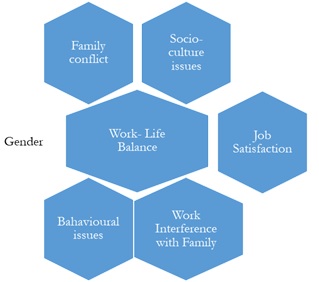Gendered Perspectives in Workplace Dynamics: Supervisory Satisfaction and Work-Life Balance
Keywords:
Work-Life Balance, Gender Difference, Satisfaction Level, Dynamics.Abstract
Gender differences have been identified as significant factors in the workplace. The happiness experienced by employees with their supervisors subsequently leads to increased job satisfaction and enhanced productivity. This study endeavors to explore the interplay of gender dynamics, supervisory satisfaction, and Work-Life Balance (WLB) within an organizational framework. Utilizing a quantitative approach via survey questionnaires, the research aims to establish associations among these elements. Employing the WLB Scale and Satisfaction-With-My-Supervisor Scale (SWMSS) instruments, hypotheses were formulated based on existing literature to investigate gender disparities in WLB and supervisory satisfaction. Convenient sampling across various enterprises in Pakistan yielded 200 participants meeting specified criteria. The study unfolded multifaceted insights into subordinate-supervisor relationships, gender congruence, and their impacts on WLB and supervisory satisfaction. Notable disparities emerged between same-gender and opposite-gender supervisor-subordinate pairs, elucidating the positive correlation between gender congruence and effective working relationships. While satisfaction levels varied modestly based on supervisor gender, unfavorable organizational events did not significantly impact WLB or supervisory satisfaction concerning gender. Moreover, the study identified a significant negative influence of WLB on job satisfaction, highlighting specific aspects of WLB that notably impact satisfaction levels. This investigation challenges prevalent misconceptions by revealing limited gender disparities in WLB experiences, despite statistically significant yet negligible associations favoring women in specific aspects of work-family conflict. Dissections into parental status and dual-earner couples reflected nuanced relationships, with women often experiencing higher interference with work in these scenarios. Explorations into employment duration under supervisors underscored significant correlations with supervisory satisfaction, while marital status predominantly influenced WLB. The study's focus on supervisor-subordinate dynamics aims to foster healthier relationships, acknowledging certain limitations such as the reliance on quantitative methods and sample specificity. In conclusion, this study illuminates the preferential treatment within same-gender supervisor-subordinate relationships, suggesting an inclination of supervisors toward subordinates of their gender. Moreover, the research underscores the substantial impact of employment duration under a specific supervisor on overall satisfaction. Despite criticisms, WLB remains a crucial influencer of observed outcomes, hinting at the intricate balance between work and personal life domains. The findings not only challenge common perceptions but also underscore the need for more in-depth explorations into these issues to better comprehend the impact of gender dynamics on workplace relationships and individual satisfaction.








